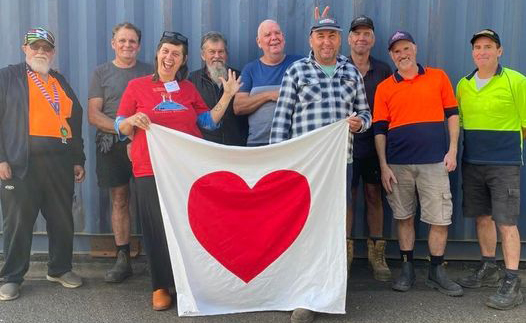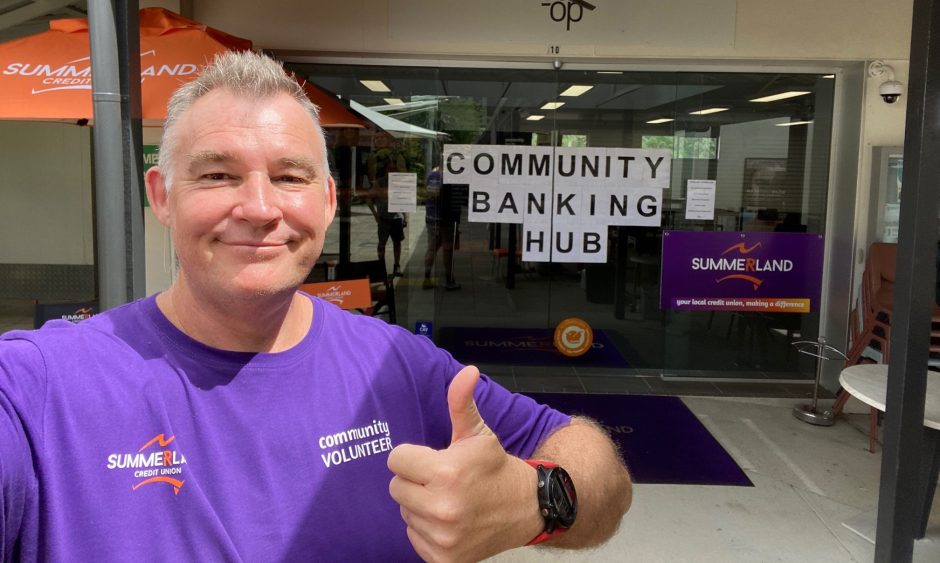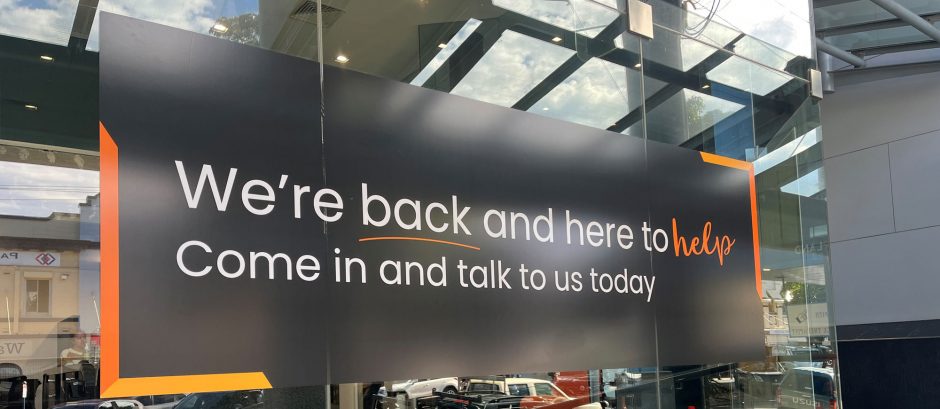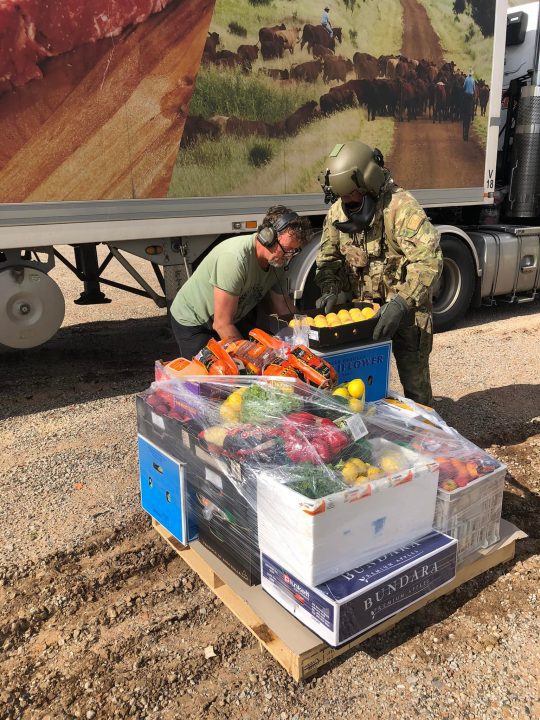With New South Wales suffering more floods, just months after the disaster that submerged huge areas of eastern Australia, the co-op movement is stepping up its efforts to offer assistance.
Heavy flooding broke out this month around the Sydney and Central Coast area, destroying homes, leaving people without power and killing at least one person.
This comes hard on the heels of the devastating floods that hit between February and April, which left at least 22 people dead. One of the worst disasters in Australian history, it wrecked homes and businesses, caused food shortages and left a bill of AU$4.8bn. The country is also still feeling the impact of the bushfires crisis of early 2020, as well as the Covid-19 pandemic.
The Australian Mutuals Foundation (AMF), in partnership with the Business Council of Co-operatives and Mutuals (BCCM), G&C Mutual Bank and Summerland Credit Union, is offering small grants to support co-ops, mutuals and their members as they help their communities recover.
Local charities and community groups that work with co-operatives in affected communities are also eligible to apply for funding.
This follows donations of more than AU$208,000 from co-operatives around the world, says BCCM.
BCCM has also been sharing stories of co-ops and credit unions which have been stepping up during the crisis – with those in the Lismore area of the Northern Rivers region of New South Wales inundated by the floods in the first half of the year. The region has not been caught by this month’s floods but still has a long way to go in its reconstruction efforts.
Norco Dairy Co-op, whose ice-cream factory, head office and rural store in South Lismore were inundated with floodwater on 28 February, has been working to support its workers while operations are suspended. It established a Go Fund Me page for employees and farmers , raising $109,794.15 as at 28 June, “100% of which has been directly distributed to those in need to support the rebuild and recovery process”.
It has also engaged with businesses to find alternative job options for staff – which, it says, is also useful for firms struggling with workforce shortages after the floods.
Related: How co-ops around the world step up when disaster strikes
“In addition,” it said, “where there have been requests for relocation that align with relevant job openings, we have facilitated this within the business, while following all other HR best practice protocol around workforce support including training, CV and job seeking assistance, as well as additional apprentice support to ensure skills and training are maintained.”
Thanks to a federal support package, the co-op has also been paying its employees to work in the community with volunteer group Resilient Lismore.
“Resilient Lismore has tasked Norco crews to some of our biggest, dirtiest jobs,” said the volunteer organisation in a Facebook post. “Demolitions, clean-ups and yard work. You name it. Every morning they arrived at the volunteer hub ready and willing to serve the most vulnerable in their community – some workers flood affected themselves.
“Norco workers, Lismore supports you every step of the way. We hope with all our heart that things work out for you all.”

The Norco team’s work with Resilient Lismore ended on 12 July and the 170 ice cream factory workers had faced an uncertain fate; the co-op is still unable to cover workforce costs while the site is out of action, and the emergency federal support package was due to run out at the end of this week.
But the government has today (14 July) stepped in with a last-minute reprieve, announcing a $2.7m support package. The 10-week package gives Norco enough time to apply for further funding from a $59.3m business support programme, set up to help employers in the Northern Rivers region of New South Wales rebuild from the floods.
Norco CEO Michael Hampson said: “We hope this represents the first step in delivering greater funding outcomes for the region in order to drive a business-led recovery.”
Related: Australian co-op sector responds to catastrophic Queensland and NSW floods
There had been 240 workers awaiting news of their future, but some have moved on to other jobs.
Emergency management minister Murray Watt, who announced the package, said Norco needed time to establish a long-term plan because of the extent of the flood damage.
“This short-term financial relief also means the community, which had already been through great turmoil this year, isn’t further impacted by losing one of its major employers,” he said.
The package allows factory workers who are not part of community clean-up efforts to work for other Northern Rivers businesses to address workforce shortages in the region.
Norco is one of several major businesses calling for the business support programme to be doubled, saying the existing package will not support a full recovery – and Hampson warns that rebuilding the ice cream site will depend on the level of support from the federal and state governments.
“Norco is ready and our staff are ready,” he said. “I have a renewed sense of optimism for the future of the facility and we look forward to the day we celebrate its reopening.”
Another key co-op player in the flood recovery effort is Summerland Credit Union, most of whose 30,000 members live in the Northern Rivers area. With 10 branches, it is primarily a mortgage lender, with 5% of its business in commercial lending.
In a podcast, BCCM interviewed CEO John Williams, who said the credit union has played a key part in community recovery, even though its own branches were left under water. This work continues a strong line on climate change and the environment – which, says Williams, started 12 years ago, with Summerland aligning itself with the UN Sustainable Development Goals on gender equity, decent work and economic growth, sustainable cities and communities and climate action.

“We are deeply connected with the community within the Northern Rivers,” he said. This commitment includes environmental causes, including efforts to protect koalas in the Bangalow area – with financial support and staff given volunteer days to plant tree corridors, which the animals can use as migration pathways.
The floods have highlighted just how urgent these environmental questions are, and mean that Summerland is “not running at 100%,” said Williams. “The disruption for us as a business, but probably more so for the community, has been quite, quite significant in that sense.”
But Summerland was helped by is co-operative values, he said, which brought “real clarity of purpose”. It activated its flood-specific business continuity plan, clearing its premises ahead of the forecast disaster.

Unfortunately the flooding was much worse than predicted. In areas like Lismore, every bank branch and ATM was destroyed, leaving residents with cashflow problems. In response, cash was helicoptered in to affected regions. In Lismore, Summerland worked with Southern Cross University to set up an emergency community-banking hub.
“We established that hub four days after the flood,” said Williams, “and we invited five other mutual banks to come and join us in that facility. We could have taken that facility for ourselves, but as … a community-based organisation, we didn’t think that that was the best thing for the community. The best thing we could do is get a broad range of services.”
Summerland has reopened its Molesworth Street branch in Lismore but will continue its operation at Southern Cross to give locals the option of two branches.

Summerland also worked with Norco, a dairy co-op which was hit especially hard by the disaster, to set up emergency payroll facilities.
“We have a quite a tight network of co-operatives within the region,” said WIlliams. “I meet quite regularly with the executives and CEOs from Casino Food, from Norco, from macadamias, from the blueberry industry … to look at options and ways that we can further support the community and rebuild businesses.
“I really do think it comes back to clarity of purpose so as a co-op or a mutual, we’re very clear who our owners are. It’s our customers.“
This sense of purpose saw Summerland contact all its mortgage customers to check on their welfare, offer hardship support and help them with insurance claims.
Related: BCCM calls for co-ops to be included in disaster and recovery planning
Summerland is hoping to secure a $200,000 pot of reconstruction funds, from the AMF and other sources, with a primary goal of restoring what has been destroyed in the disaster.
The crisis has improved the visibility of Summerland and of its co-op model, he adds, with significant member growth in the aftermath of the floods. “We’re open, we’re visible,” said Williams. “We ran a advertising campaign to let the community know that we were here, particularly through social media.”
With the pandemic hitting the country alongside the bushfires and floods, Australia has been through tough times. For organisations like Summerland, Williams says the response “is just about expecting the unexpected”.
Climate change, he warned, means that “the norms in the past are not necessarily the norms of the future. And we need to start catering for unexpected events more so than what we have done in the past. Being a financial institution, we have high levels of compliance and regulation that support us in that endeavour. And I’m sure the banking regulator, APRA, is doing some further work on that as well. It’s just a matter of being prepared and changing the mindset.”
Also working to relieve the situation in the Northern Rivers area is Casino Food Co-op, the largest farmer-owned meat processing co-op in Australia, which snapped into action to set up an emergency food distrubution hub – offering the use of its infrastructure: a refrigeration plant and equipment, forklifts, helipad, fuel tanks, mobile generators and earth moving equipment.
Staff, including plant workers and cleaning teams, volunteered for the relief effort by cleaning homes and assisting with food distribution, and production was shut down for a number of days to focus the co-op’s resources on the disaster response.
The co-operative also agreed to take in the entire fresh produce – 20 pallets’ worth – of a Lismore fruit and veg shop after it was evacuated, which BCCM says was “vital in keeping locals in evacuation centres alive”.
And it served as the centre for air drops to the isolated and cut-off communities – delivering 90 pallets of food, using 20 helicopters and 11 trucks to 14 communities, feeding an estimated 4,000 people.
CEO Simon Stahl told a BCCM podcast that his the co-op had already been looking at sustainability issues, including ways to limit pollution of the river systems from farm run-off. It worked with Southern Cross University to set up a Soil Club to improve grass cover and increase carbon sequestration. It is also working with the World Wildlife Fund and other organisations to plant trees to give koalas a migration corridor in the River Crystal area.

He said the floods have brought “the most challenging times in all of our lives in this region”, requiring hard work to get production back up and running. Help – including an in-house counselling service – was offered to colleagues who had lost their homes.
“The infrastructure is coming good over time, certainly the roads around here,” he said. “But now it’s all about labour and skills.
“The region was struggling before the floods. And I think it’s compounded the problem, particularly with the lack of housing. So there are a lot of scars, you know, still with a lot of people.
“We’re working again collaboratively with our partners in the region to make sure that the businesses and the major stakeholders have a little bit of a say and make sure it doesn’t get lost on government … we’re certainly working with the community because we have a responsibility to play in that.”
Casino’s co-op model gives it a connection to the community, says Stahl, which was useful in driving a response to the flood. It contributed to the emergency measures by delivering food to evacuation centres, using its network of cold stores and transport equipment and even turning its car park into a helipad. And tapped into its thousand-strong team of employees for volunteering and to provide useful local knowledge – including a woman who knew how to access some vital supplies of baby formula.
“it’s our company,” he added, “and our people are so proud of what we’re able to do. And I think that augurs well for the business.”

“This disaster highlights how important it is for industry and emergency services to come together for the good of the community,” said BCCM in a submission to the official flood enquiry.
North of Lismore, in the Hawkesbury Nepean area and Richmond Valley, CivicRisk Mutual has also been hard at work. The mutual, which provides property protection to 26 local authorities in NSW, stepped in to ensure council buildings and community centres were repaired.
Related: World’s insurance mutuals look at the co-op approach to disaster risk
“In the case of our regional councils we provide water and sewerage services to properties and the infrastructure in Richmond Valley region was severely damaged,” CEO Andrew Armitstead told Co-op News. “CivicRisk Mutual works closely with the councils to get them back and operational as soon as possible. The past 12 months have been the largest number and most expensive flood claims in our 34-year history.

“We have made immediate payments to council to get them back and running once we knew the extent of the problem so they had cash to start rebuilding and worked with them to maximise financial support from the governments as the impact to uninsured infrastructure roads, parks etc are far greater than the council buildings we insure.”
CivicRisk has been an unsung hero of the crisis, acing as “a silent partner” offering support to councils. “The community has been fantastic however they are under extreme stress and are exhausted. They would not be aware of the role our organisation performs because we support the council and they deliver the services,” said Armitstead.
“One way the mutual helped the community was to develop a flyer to help residents to make claims on their insurer providing definitions of flood and storm damage and helpful hints to help.”
He says CivicRisk’s mutual model is crucial in providing resilience, because it involved councils all across NSW – not all of which are as severely affected by floods. “As such the risk is spread and we are able to get more cover for the whole as opposed to the councils going to the market on their own.”
The worst hit councils, he adds, would struggle to get good flood cover – if any – but “together through risk sharing they can get more cover at a cheaper price”.
Armitstead told BCCM he wants to see more collaboration between federal, state and local government to “build infrastructure that provides resilience as we face the impact of climate change” – such as improved water management and better town planning in flood-risk areas.
His mutual is considering its own risk strategies, including the relocation of affected buildings, emergency procedures to move expensive equipment from community buildings, and training sessions to share lessons from affected members.

